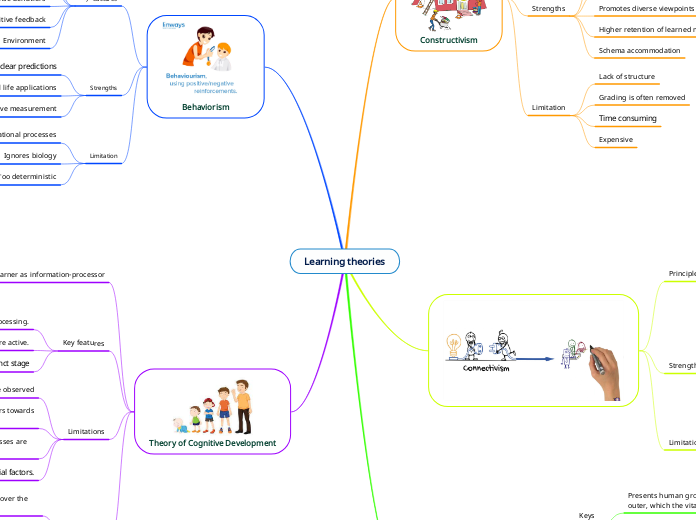Learning theories

Constructivism
Principles
Knowledge is constructed.
People learn to learn.
Learning is an active process.
Learning is contextual and is a social activity.
Motivation is key.
Strengths
Promotes student agency
Develops advanced skills
Promotes diverse viewpoints
Higher retention of learned material
Schema accommodation
Limitation
Lack of structure
Grading is often removed
Time consuming
Expensive

Principles
Learning and knowledge rests in diversity of opinions.
Ability to see connections between fields, ideas, and concepts is a core skill.
Learning is a process of connecting specialized nodes.
Strengths
Fosters collaborative skills.
Shifts the learning responsibilities from the teacher to the student.
Supports individual perspectives and the diversity of opinions.
Limitation
Teachers may have difficulty transitioning to leadership role to a partnership role.
Students feel anxiety from being singled out according to their ability levels.

Theory of Human Development
Keys
Presents human growth- as conflicts, inner and outer, which the vital personality emerge.
Actives forces in a person shapes the specific content of his life.
Strengths
Emphasizes the influence that social relationships have on development.
Provides a broad framework from which to view development throughout the entire lifespan.
Limitation
Explains more psychosocial development than explaining how and why it occurs.
Fails to detail exactly what type of experiences are necessary at each stage

Behaviorism
Key feactures
Stimulus-Response
Observable behavior
Response behaviors
Positive feedback
Environment
Strengths
Provides clear predictions
Real life applications
Emphasizes objective measurement
Limitation
Ignores mediational processes
Ignores biology
Too deterministic
Theory of Cognitive Development
Learner as information-processor
Absorbs information
Undertakes cognitive operations on it.
Stocks information in memory.
Key features
Study how is information processing.
Learners are active.
Development occurs in unique and distinct stage
Limitations
Cognitive processes cannot be observed
Ignores other factors towards
behaviour.
Assumes that all people's cognitive processes are the same.
Little attention to the impact of social factors.
Strengths
Explain how learning and skills changes over the course of a lifetime.
Emphasize the need for learners to interact with their environment.
Understand how problem solving changes throughout childhood
